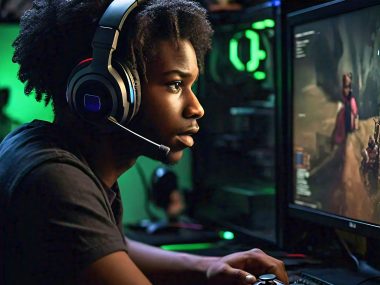A Logical Move, Not a Risky One
Krafton’s decision to become an AI-first company isn’t surprising. It’s logical. This is the same company behind PUBG and the parent of Subnautica 2 developer Unknown Worlds, studios known for experimenting with technology. Now, Krafton plans to automate workflows using agentic AI so employees can focus on creative problem-solving.
It’s a massive shift. The company is investing nearly $70 million to build a GPU cluster and another $21 million annually to provide employees with direct access to AI tools starting in 2026. Their goal is simple: let AI handle repetitive tasks so humans can do what humans do best. Think creatively.
While some call this move risky, in context, it’s exactly the kind of transformation that has already proven successful across Asia.
Why the West Hates What Asia Has Mastered
In the U.S., AI is often seen as a threat, a destroyer of jobs and creativity. The conversation is rooted in fear: fear of being replaced, fear of declining quality, fear of change. That fear says more about the country’s educational and cultural mindset than it does about AI itself.
Asia’s story is different. In China, AI isn’t feared, it’s normalized. About 515 million people, or 36.5% of the population, actively use generative AI. The government’s AI Plus strategy integrates it into manufacturing, governance, and healthcare. When automation displaces workers, citizens are retrained, reskilled, and repositioned into new roles.
It’s a practical response. AI displaces some jobs, yes. Particularly low-skill ones. But China’s investment in education and vocational training helps citizens move toward new opportunities instead of being left behind. That’s the part the U.S. refuses to confront.
We dismantled educational systems instead of modernizing them. We complain about tedious work but reject the tools that could eliminate it. That contradiction runs deep. Americans say they want innovation, but only on the condition that it doesn’t require personal adaptation.
South Korea’s Quiet Success
Krafton’s home country, South Korea, offers another model of success. Roughly 28% of South Korean companies already use AI, surpassing U.S. adoption rates. Rather than replacing workers en masse, AI helps address an aging population and labor shortages.
South Korea has navigated automation smartly:
- By investing in reskilling and vocational programs.
- By providing social safety nets to smooth career transitions.
- By using AI to boost productivity rather than simply cut costs.
It’s an ecosystem built on cooperation between government, corporations, and workers. AI isn’t seen as a competitor. It’s a collaborator. That’s the environment Krafton operates in.
What Krafton’s Transformation Means
Krafton’s “AI-first” strategy isn’t a gimmick. It’s a sweeping reorganization of how the company functions. The goal is to embed AI into everything. From HR systems to development pipelines, freeing employees from tedious processes. CEO Kim Chang-han described this shift as a way to “drive productivity, foster change, and expand growth opportunities.”
That last part is key: growth opportunities. Not just for Krafton, but for its people. By using AI to handle what humans have long complained about, the repetitive, draining tasks, the company is positioning itself to focus on creativity and innovation.
It’s worth noting that this is not about cost-cutting or layoffs. It’s about evolution. Krafton is betting that AI will amplify human talent rather than replace it.
The Paradox of Resistance
Here’s the irony. Many American workers complain about the very jobs AI is taking over. The data entry. The scheduling. The endless administrative drag. When AI offers to remove those burdens, people reject it out of principle.
That rejection comes from fear but fear doesn’t stop progress. It only ensures that progress happens elsewhere. AI isn’t going away because it’s not a fad. It’s a technology that’s already reshaped entire economies.
Running from it doesn’t solve anything. Adapting to it does.
Responsible Use Still Matters
None of this means blind acceptance. People have every right to reject AI products or demand transparency. Laws must evolve to prevent AI misuse, from fake news generation to identity theft. Ethical oversight is essential. Rejecting AI outright because it’s “scary” or “different” isn’t logical.
Technology doesn’t stop developing because we refuse to engage with it. It moves forward without us.
The Bigger Picture
Krafton’s decision is a reflection of its environment. South Korea’s culture of technological adaptation, China’s large-scale AI success, and Asia’s overall acceptance of progress all create a climate where Krafton’s move feels natural.
In contrast, the U.S. lags behind. Not because it lacks innovation, but because it resists change. The fear of AI isn’t really about technology. It’s about accountability. It’s easier to blame machines than to admit we’ve fallen behind in education, training, and adaptability.
AI is meant to work with humans, not against them. Krafton understands that. Its transformation shows what happens when a company, and a culture, embraces new tools instead of fearing them.
If the U.S. wants to remain competitive, it needs to learn the same lesson: Adaptation isn’t optional. It’s survival.






